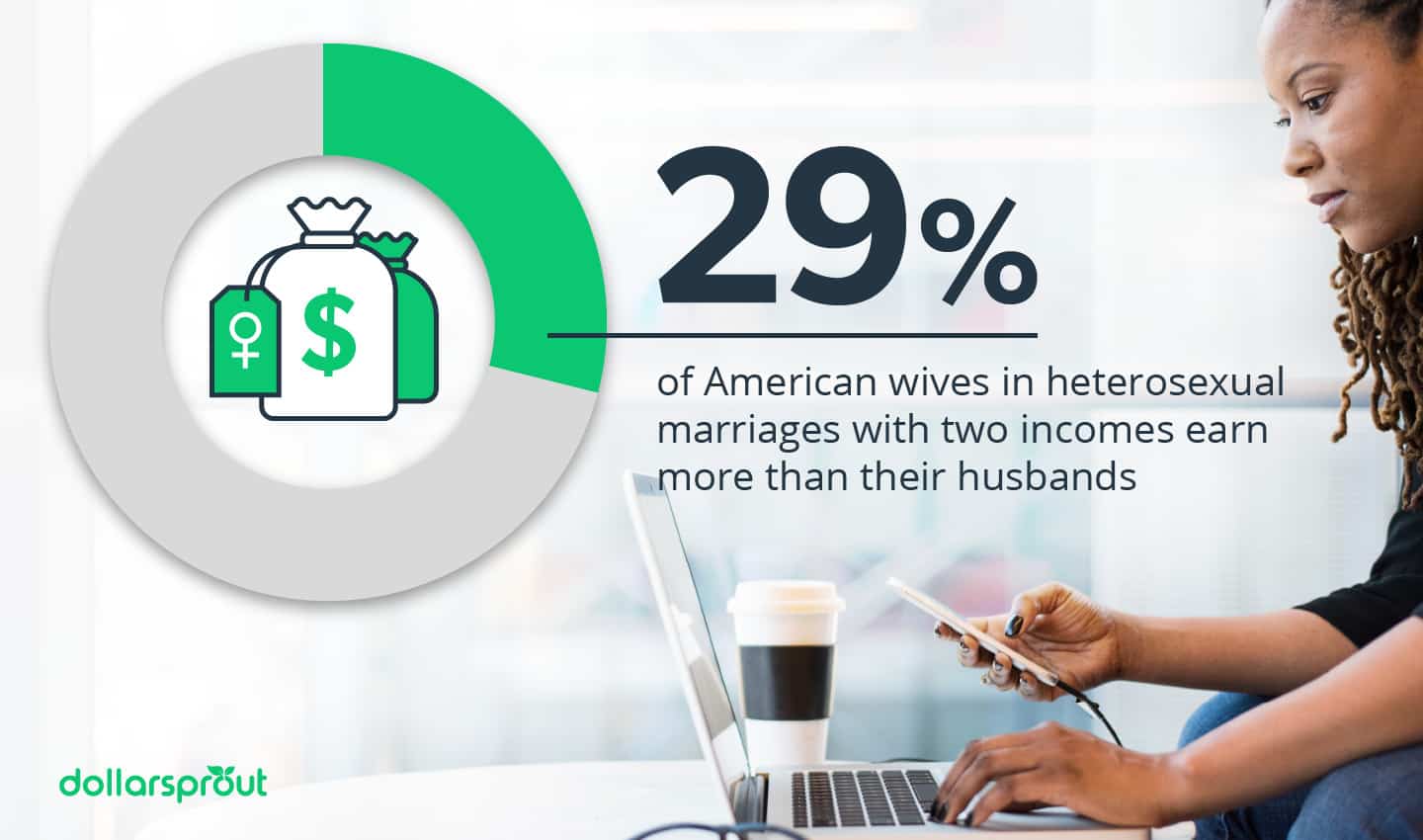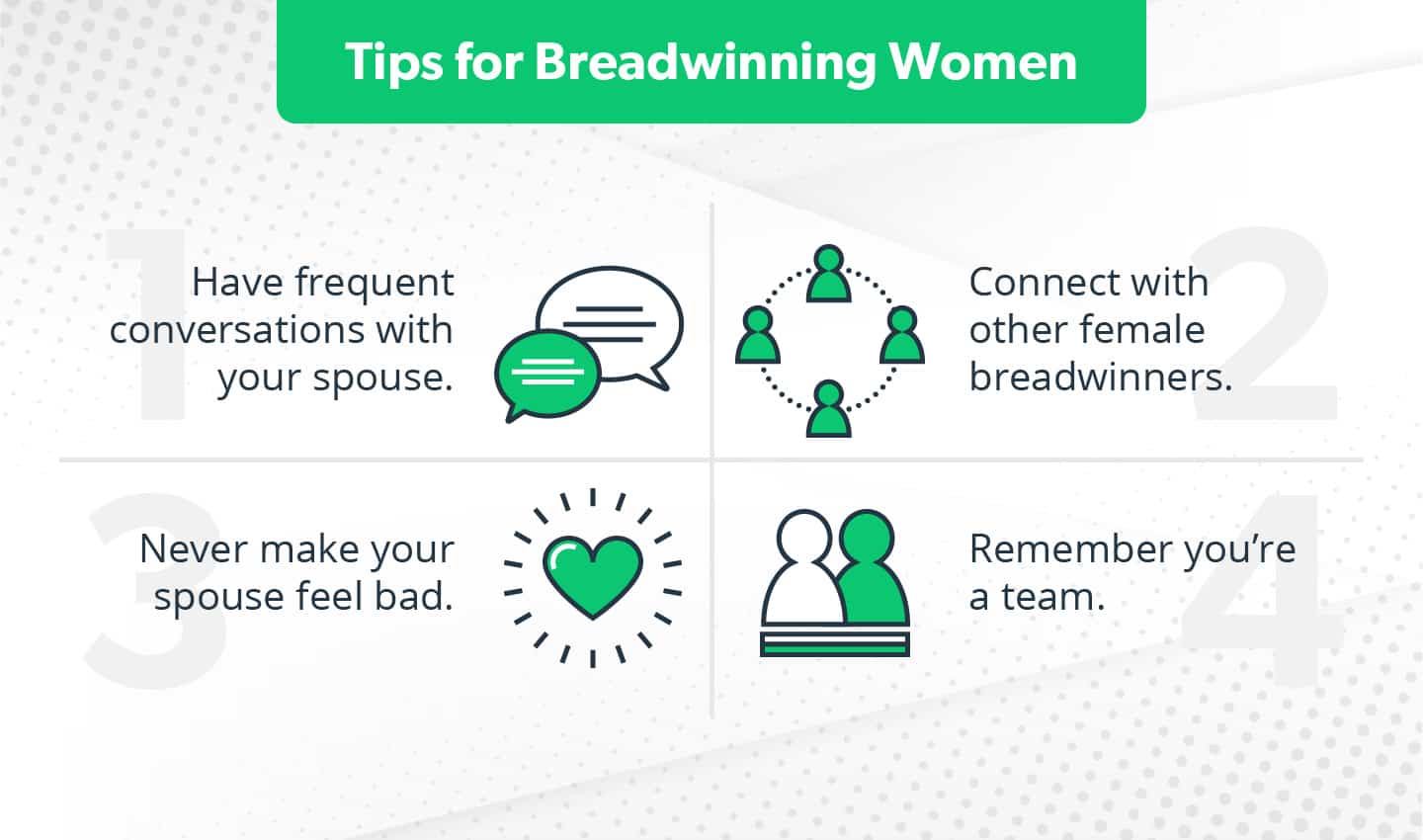Overcoming the Challenges of Being a Female Breadwinner
Our readers always come first
The content on DollarSprout includes links to our advertising partners. When you read our content and click on one of our partners’ links, and then decide to complete an offer — whether it’s downloading an app, opening an account, or some other action — we may earn a commission from that advertiser, at no extra cost to you.
Our ultimate goal is to educate and inform, not lure you into signing up for certain offers. Compensation from our partners may impact what products we cover and where they appear on the site, but does not have any impact on the objectivity of our reviews or advice.
Gender norms have shifted significantly over the last 50 years. Even though being a female breadwinner is more common than ever before, it still comes with its own set of unique challenges. Here's how to navigate them.

Our mission at DollarSprout is to help readers improve their financial lives, and we regularly partner with companies that share that same vision. If a purchase or signup is made through one of our Partners’ links, we may receive compensation for the referral. Learn more here.
Gender norms have shifted significantly over the last 50 years.
For most of American history, it was common for men to be the sole or primary provider in the family while women stayed home to take care of the house and children. It was rare for a woman to work full time, let alone be the primary breadwinner of the household.
Today, that’s no longer the case. The Bureau of Labor Statistics found that 29% of American wives in heterosexual marriages with two incomes earn more than their husbands.[1]
Danielle Holtjer is an example of a female breadwinner. She owns a counseling clinic while her spouse works in construction. At first, she felt empowered and proud to be the high earner in her home. But as the years went on, she faced challenges and feelings of resentment she never expected.
Her success took a serious toll on her partner’s self-esteem, and her friends and family made negative comments about her breadwinner status.
Holtjer said that even though female breadwinners are no longer unheard of, we still live in a society where men are “supposed to” earn more.
Why It’s Hard to Be a Woman Earning the Majority of the Money
Holtjer’s situation isn’t unique. Many women in her shoes find that being a female breadwinner comes with a variety of challenges.
Guilt
Even though society has evolved, you may feel a sense of guilt if you earn more than your male partner.
“Guilt is often the result of ‘caveman psychology,’ which may lead you to believe that the man needs to be the provider and the woman must take care of the house,” said financial therapist Denise Hughes.
Hughes, who is the breadwinner in her family, said she wards off this guilt by practicing gratitude for her husband’s ability to take on the role of “Chief Entertainment Officer or CEO.” When she’s busy with work, he plans all of the concerts, dinner dates, and other social activities they attend.
Related: Opinion: Married Couples Should Have Separate Bank Accounts. Here’s Why
Negativity from others
As a female breadwinner, you may hear negative remarks from your friends, family, and even random strangers. Many people still cling to traditional beliefs and don’t approve of women outearning their spouses.
Lindsay Bryan-Podvin, a financial therapist, said that people will likely say things like, “Your husband must love that you make all the money,” or, “I could never be in a marriage where my husband wasn’t earning more.”
Her advice: Ignore the naysayers and realize that nobody knows what’s best for your family but you. She also recommends that you recognize and take pride in your success.
“When others resent you for earning more than your partner, you may be tempted to downplay your accomplishments,” Bryan-Podvin said. Instead, remind yourself of your hard-earned successes and how far you’ve come.
Related: Money and Relationships: How to Merge Finances without Any Drama
Pressure to succeed
When your partner and children depend on your breadwinning status to live a good life, you may feel immense pressure. Mikaela Kiner feels this often and believes that her care-taking nature doesn’t help. She feels she has to excel in her position as the CEO of an HR consulting firm, but also be there for her two teens.
To take some pressure off herself, she keeps a large emergency fund and suggests that others in her position do the same. This way when uncertainty in the economy, your company, or position arises, you won’t be scared. You’ll feel calm because you have savings and peace of mind.
Difficulty relating to other women
Marketing director Kelly Schuknecht is the breadwinner in her family. She has three kids and has always worked in demanding leadership roles. Over the years, Schuknecht found it hard to relate to other women and develop meaningful friendships with them.
“I’m not the mom who chaperones every field trip or bakes cookies for the school parties,” she said.
Many women have a difficult time understanding her because she doesn’t fit their idea of what a good mom should do for their family.
Related: How to Improve Your Finances Based on Your Enneagram Type
Tips for Breadwinning Women
If you’re a woman who struggles with earning more than your partner, make sure to keep the lines of communication open in your relationship and connect with other female breadwinners for support.
Have frequent conversations with your spouse.
Instead of ignoring the situation, make sure you have open, honest, and constructive conversations with your spouse on a regular basis. Share your feelings and concerns about you being the primary earner and encourage them to do the same.
If you’re overwhelmed with being the breadwinner because you have childcare and household tasks to take care of as well, ask your spouse to take some of those duties off your plate. If your breadwinner status makes your spouse feel less adequate or insecure, lovingly reassure him that his contributions are important to your family.
“It’s essential that you’re both clear about what you need and expect from one another,” said financial therapist Amanda Clayman. “Being flexible and making changes to help each other is just as important.”
Related: How to Get Your Spouse on Board with Paying Off Debt
Connect with other female breadwinners.
It’s a lot easier to cope with the challenges of being a female breadwinner when you surround yourself with other women who can relate. Bryan-Podvin suggests that you attend networking events or join professional organizations to meet other female breadwinners.
“These women can cheer you on and share valuable advice when things get tough,” she said. “They can give you the emotional connection you need to thrive as the successful provider for your family.”
Never make your spouse feel bad.
Men are conditioned within our society to believe it’s their primary responsibility to provide for a family. Not living up to this perceived expectation can create feelings of resentment, frustration, or a lack of self-worth.
Robin Rucinsky has been the breadwinner in her family for the past seven years. She works as a media director while her husband stays at home with their four children. In her early days of being the sole provider, she would get stressed and make comments to her husband about his lack of financial contribution. Those words struck a cord, and they still come back to haunt their marriage on occasion.
Rather than criticize one another, recognize and acknowledge your individual contributions.
In time, Rucinsky and her husband discovered that her working while her husband stays at home is the best decision they’ve made for their family. “Our girls get to have an incredible relationship with a present father,” she said. “Our son gets to spend time with his dad and learn how men can be both providers and nurturers.”
Related: Financial Infidelity: 4 Signs Your Partner Isn’t Being Honest About Money
Remember you’re a team.
Kelly Andersen works in financial services while her husband works as a high school football coach. She significantly outearns her husband but doesn’t use her breadwinner status as a power dynamic.
Andersen recommends that other women in her situation remember that at the end of the day, they’re part of a team with their spouse. Don’t let what each person makes define who they are.
Like Andersen, James Pollard embraces this team mentality. His wife outearned him in the early years of their relationship, and he says it didn’t bother him. He admired his wife’s ambition and encouraged her to earn more because he knew they’d both benefit.
“Unless your wife hides money from you or gives you an allowance, all the money flows to your household,” he said. “You should want her to earn more.”
Related: Should Debt Be a Marriage Deal Breaker? How to Have the Debt Talk











